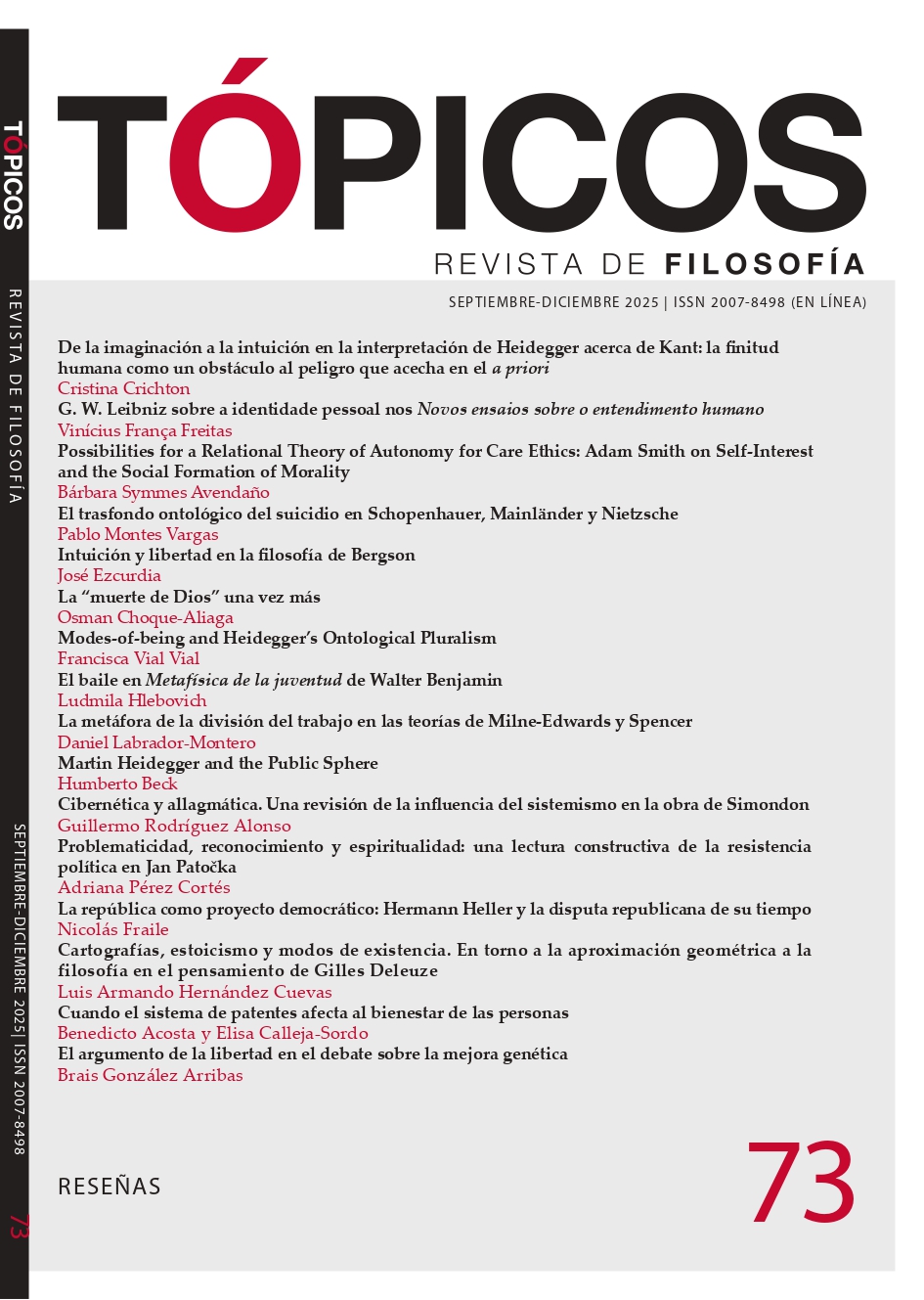Cartographies, Stoicism and Ways of Existence: Regarding the Geometric Approach to Philosophy in the Thought of Gilles Deleuze
Published 2025-08-25
Keywords
- relation,
- image,
- logic,
- paradox,
- incorporeal
- Deleuze,
- stoicism,
- geometry,
- nomadology,
- sedentary history of philosophy,
- cartography ...More
Copyright (c) 2025 Tópicos, Revista de Filosofía

This work is licensed under a Creative Commons Attribution-NonCommercial-NoDerivatives 4.0 International License.
How to Cite
Abstract
This article has three objectives: first, to understand, through the philosophy of Gilles Deleuze, how a philosophical cartography is created; second, to present one as an example, in this case, that of ancient Stoicism; third, to think about how the generation of cartographies makes it possible to conceive the creation of philosophical maps as openings towards dissimilar modes of existence. Thus, fixed on these difficulties, the text first discusses the Logic (as a technical term) of relationships, the images of philosophers, and the “figures of thought” as the framework under which philosophy creates cartographies. Second, it presents Stoicism as a Logic of incorporeals that created a way of existence that affirms “the event”. Finally, the article discusses how the creation of cartographies, assumed as philosophical (geometric) nomadology, breaks with the idea of a sedentary history of philosophy.
References
- Boeri, M. (2001). The Stoics on Bodies and Incorporeals. The Review of Metaphysics, 54(4), 723-752.
- Bréhier, É. (2011). La teoría de los incorporales en el estoicismo antiguo. F. Contreras, R. Pinciroli y P. Román (trads.). Leviatán.
- Bronowski, A. (2019). The Stoics on Lekta: All There Is to Say. Oxford University Press. https://doi.org/10.1093/oso/9780198842880.001.0001
- Brunschwig, J. (1994). Papers in Hellenistic Philosophy. Cambridge University Press. https://doi.org/10.1017/CBO9780511518393
- Deleuze, G. (1953). Empirisme et subjectivité. PUF.
- Deleuze, G. (1983). Sur le cinéma : une classification des signes et du temps. The Deleuze Seminars. https://deleuze.cla.purdue.edu/lecture/lecture-20-2/
- Deleuze, G. (2005). Lógica del sentido. M. Morey (trad.). Paidós.
- Deleuze, G. (2006a). Diferencia y repetición. M. Delpy y H. Beccacece (trads.). Amorrortu.
- Deleuze, G. (2006b). Exasperación de la filosofía. Equipo editorial Cactus (trads.). Cactus.
- Deleuze, G. (2011). Cine. II. Los signos del movimiento y el tiempo. S. Puente y P. Ires (trads.). Cactus.
- Deleuze, G. (2016). Cartas y otros textos. S. Puente y P. Ires (trads.). Cactus.
- Deleuze, G. (2018). Cine. III. Los signos del movimiento y el tiempo. S. Puente y P. Ires (trad.). Cactus.
- Deleuze, G., y Guattari, F. (2006). Mil mesetas. Capitalismo y esquizofrenia. J. Vázquez (trad.). Pre-textos.
- Deleuze, G., y Guattari, F. (2009). ¿Qué es la filosofía? T. Kauf (trad.). Anagrama.
- Deleuze, G., y Parnet, C. (2013). Diálogos. J. Vázquez (trad.). Pre-textos.
- Diógenes Laercio. (2019). Vidas y opiniones de los filósofos ilustres. C. García Gual (trad.). Alianza.
- Euclides. (1996). Los estoicos antiguos. Á. Cappelletti (trad.). Gredos.
- Foucault, M. (2013). El orden del discurso. A. González (trad.). Tusquets.
- Johnson, R. J. (2018). On the Surface: The Deleuze-Stoicism Encounter. En A. Greenstine y R. J. Johnson (eds.), Contemporary Encounters with Ancient Metaphysics (pp. 270-288). Edinburgh University Press. https://doi.org/10.3366/edinburgh/9781474412094.003.0015
- Johnson, R. J. (2022). Deleuze, a Stoic. Edinburgh University Press.
- Kirk, G. S., Raven, J. E. y Schofield, M. (1987). Los filósofos presocráticos. J. García (trad.). Gredos.
- Kojève, A. (2013). Introducción a la lectura de Hegel. A. Martos (trad.). Trotta.
- Leibniz, G. W. (2010). Obras filosóficas y científicas. 2. Metafísica. A. González (trad.). Comares.
- Núñez, A. (2010). Gilles Deleuze y la escuela estoica. ÉNDOXA, 25, 347-363. https://doi.org/10.5944/endoxa.25.2010.5237
- Platón. (2008). Diálogos III. Fedón, Banquete, Fedro. C. García Gual, M. Martínez y E. Lledó (trad.). Gredos.
- Salles. R. (2013). Chrysippus on Conflagration and the Indestructibility of the Cosmos. En R. Salles (ed.), God and Cosmos in Stoicism (pp. 118-134). Oxford University Press. https://doi.org/10.1093/acprof:oso/9780199556144.003.0006
- Sambursky. S. (1987). Physics of the Stoics. Princeton University Press. https://doi.org/10.1515/9781400859009
- Wardhaugh, B. (2022). Las infinitas vidas de Euclides. M. Figueras (trad.). Shackleton.






